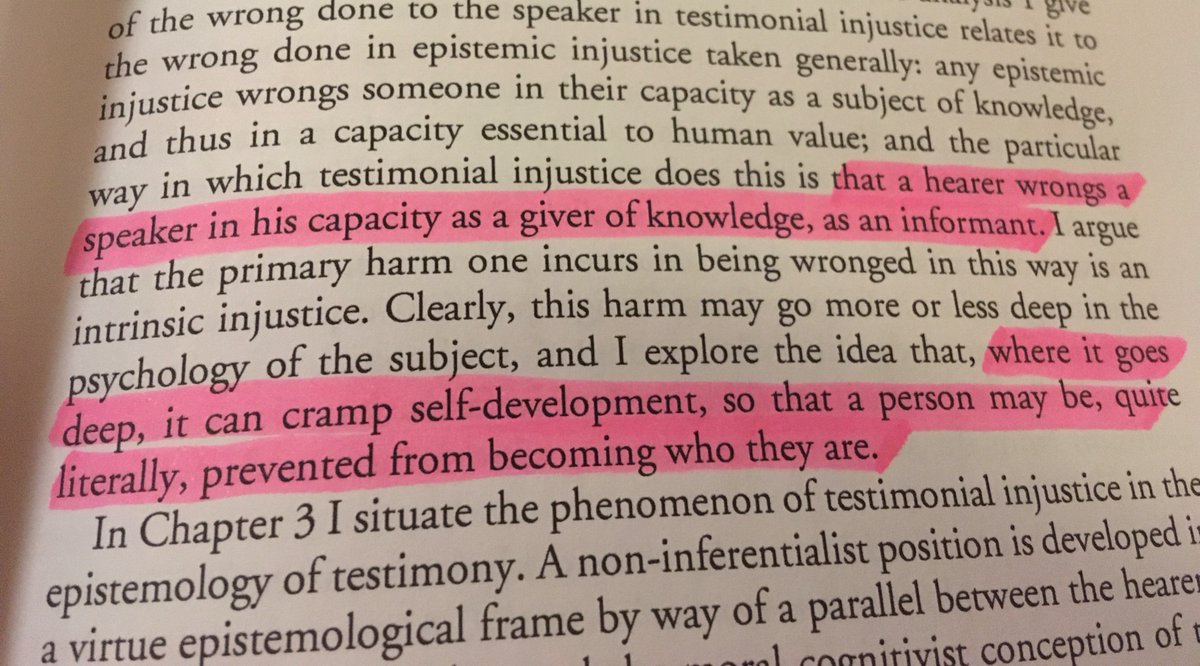[Thread summarising the book as I go. Might take a while! Feel free to correct me if you think I’ve got it wrong]
Intro: epistemic injustice is about unfairness and marginalisation related to knowledge.
Intro: epistemic injustice is about unfairness and marginalisation related to knowledge.
Testimonial injustice= the hearer denigrates the validity of the speaker’s knowledge due to prejudice related to the speaker’s identity- hearer sees the speaker as an unreliable informant. Repeated, it impacts profoundly on speaker’s sense of self (remind you of anything?!)
Hermeneutical injustice= structural inequalities —> some people not having tools to create self-relevant knowledge (ie make sense of what they’ve been through). Can in turn lead to testimonial injustice because hearers less likely to believe speakers whose account isn’t coherent
Power...can operate by an individual 'agent' but also can be distributed within a system (people just convey it). Power can be exerted actively + passively (implicit threat). Social power operates to create social control. Must question who or what is controlling whom and *why*.
Identity Power= power that depends on shared ideas of who we are and what we carry. Doesn’t even need us to believe it’s true- the power is in the imagination. Social stereotypes used as shorthands for credibility.
Testimonial injustice occurs when a speaker is wronged in their capacity as a knower due to prejudice regarding the speaker's identity. (Think Tom Robinson in To Kill a Mockingbird).
Prejudices can come in the form of beliefs but also we can hold them even if they are inconsistent with our beliefs. (stealth stereotypes!). Internalised and residual pictures in our minds that operates outside (and even in contravention to) our explicit belief system.
Testimonial injustice= not believing someone because of stereotyped prejudices in relation to their identity. It is not the exception, it is the rule- it is intrinsic to social exchange and therefore we need to actively correct it.
Correcting it might involve using our beliefs to correct our perceptions or using our perceptions to correct out beliefs - both offer hope for social change.
The impact of testimonial injustice is multifaceted: we lose truth as a hearer and a collective, the speaker is wronged in their capacity as a knower, which is so intrinsic to humanity that it undermines that; a profound humiliation.
The speaker loses confidence in their belief and thus their sense of self. Sharing knowledge helps us to organise our self-knowledge and belief system and therefore our sense of self. Thus being wronged in our capacity of giving knowledge obstructs our sense of self.
This could be a one-off or a persistent erosion. The consequences are direct yet also contribute to future prejudice; the speaker loses confidence in their beliefs and therefore offers them with less certainty - reducing how credible they seem to the hearer.

 Read on Twitter
Read on Twitter![[Thread summarising the book as I go. Might take a while! Feel free to correct me if you think I’ve got it wrong]Intro: epistemic injustice is about unfairness and marginalisation related to knowledge. [Thread summarising the book as I go. Might take a while! Feel free to correct me if you think I’ve got it wrong]Intro: epistemic injustice is about unfairness and marginalisation related to knowledge.](https://pbs.twimg.com/media/EpI-7LiXcAMHUJk.jpg)



